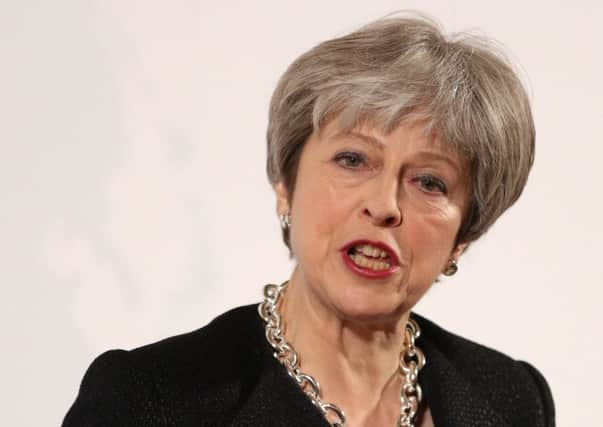Euan McColm: Leavers can taste their cake despite Theresa May's truce


In her latest Brexit speech, delivered on Friday, May was clear that neither Remainers nor Leavers would get exactly what they wanted from negotiations with the EU. There would be ups and downs ahead.
To anyone who has followed the Brexit saga – and who has paid particular attention to the remarks of European politicians – this might have seemed a statement of the entirely obvious but, at least, it injected a degree of reality into current discussions about what sort of Brexit means Brexit.
Advertisement
Hide AdAdvertisement
Hide AdI use the word reality advisedly. The truth is that, although the Prime Minister expanded on a number of areas that should be addressed as Brexit negotiations proceed, the reality is that what she described remains, for now, fantasy. Fleshed-out fantasy but fantasy nonetheless.
May spoke of her desire for a close economic relationship with the EU and named concessions – including remaining in step with current competition rules – that the UK might be willing to make in order that this relationship might be established.
The Prime Minister went on to suggest the UK would remain an associate member of various European agencies and a continuing participant in assorted European programmes.
These ambitions might be perfectly laudable but ambitions is all they are.
In negotiations with the EU, the Europeans hold all the aces while the British Prime Minister has a bus ticket and a half-filled Costa loyalty card.
It might be in her interest to find solutions which placate both Leavers and Remainers. The EU may take a different view. It may well be best for the UK to have as close an economic relationship with the EU as possible. Again, European politicians might see things another way.
During the 2014 Scottish independence referendum campaign, then first minister Alex Salmond painted a fanciful picture of a post-Yes relationship with the rest of the UK that would see Scotland get precisely what it wanted. Salmond insisted, for example, that the UK government would enter into a currency union, allowing Scots to continue to use the pound and ensuring the Bank of England remained lender of last resort.
This was typical Salmond bluff and bluster. Had Scotland voted for independence, there would not have been a single MP south of the border who’d have dared try to sell to constituents the idea that the Bank of England would continue to provide some kind of financial safety net to Scotland. When people stick two fingers up at you, you are less inclined to accommodate them.
Advertisement
Hide AdAdvertisement
Hide AdIt’s worth bearing this in mind as we listen to the Prime Minister’s aspirations for a Brexit deal.
The EU’s priority in negotiations with the UK is, quite understandably, the protection of the EU. That objective will require the UK’s departure to be an example to others who might wish to break away. In such circumstances, how May expects to win the sort of concessions she described on Friday, I have no idea.
In the aftermath of May’s speech, leading Brexit fundamentalist Jacob Rees-Mogg urged his fellow travellers on the Tory Eurosceptic right not to “nitpick” over the Prime Minister’s speech. Now was not the time for that sort of thing. Instead, now was the time – he hoped – for the EU to respond with “wisdom and not aggression”.
This might have seemed uncommonly consensual stuff (if deeply passive aggressive on the matter of the EU’s response) from the zealous Rees-Mogg but perhaps he is relaxed because he knows – and is perfectly happy – that the EU won’t give her what she wants.
Hardline Brexiteers don’t much care about the consequences of their vote. Departure from the EU is, for them, an article of faith. If the EU ends up telling the UK that no bespoke deal is available, Rees-Mogg will have got what he wants.
So, too, will the majority of those who voted to Leave. Polls show that as many as two-thirds of Brexit voters think significant damage to the economy is a price worth paying.
The Prime Minister’s speech was meant to deliver hard facts. Brexiteers could hear harder facts and they wouldn’t care. All that matters is leaving the EU.
Perhaps the hardest fact about Brexit is the issue of a hard border between Northern Ireland and the Republic. A number of leading Brexiteer fundies, depressingly, think the breakdown of the Good Friday Agreement is a price worth paying for the UK’s departure from the EU.
Advertisement
Hide AdAdvertisement
Hide AdAnd from those Brexiteers who wouldn’t go that far, we’ve seen some squirming. Johnson, for example, compared the Irish border to the lines which divide London boroughs, dismissing this complex – and troubling – issue as if it were a frippery.
Johnson’s position – basically, that the UK wouldn’t impose a hard border and if the EU did then the repercussions would be on them – was always nonsense. May’s speech made that clear.
The UK had chosen to leave, she said, and it was therefore up to the UK to help find a solution.
How Brexit and the imposition of a hard border in Ireland would impact on the Good Friday Agreement was rarely discussed during the campaign in 2016. Now, it’s clear that either are significant risks to the future of an agreement that has produced – and sustained – peace in Northern Ireland for two decades.
On this matter above all others, May must stand fast against the Brexit extremists in her party. The responsibility about which she spoke on Friday is real.
May’s Brexit speech created an uneasy truce between warring factions in the Conservative Party.
It won’t last long. Once the EU begins formally rejecting the Prime Minister’s requests for special treatment, hardline Eurosceptics will grow more confident of getting exactly what they want. Brexit, it’s becoming clear, means hard Brexit.